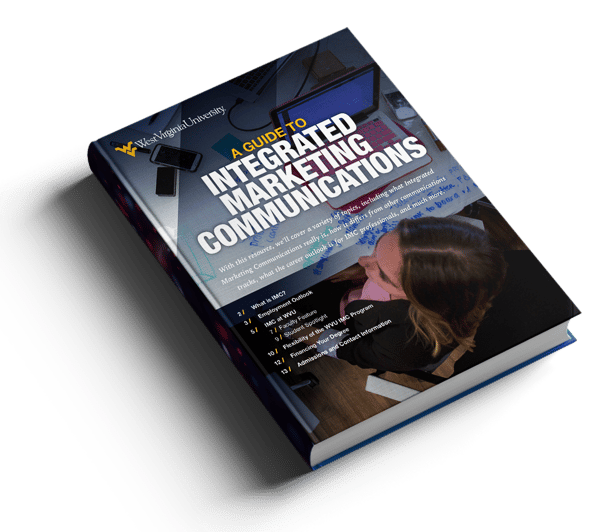A Guide to Integrated Marketing Communications
Integrated Marketing
Communications — Explained
Integrated Marketing Communications (IMC) is a strategic, collaborative, and promotional business function through which a targeted audience senses consistent, persuasive, and reinforcing brand messaging.
As a discipline, IMC attempts to unify all pieces of marketing communications, including advertising, public relations, direct marketing, social media, and sales promotion. Integrated Marketing Communications adopts a human-centered approach where messaging caters to an audience and is consistent across all channels.
With this resource, we’ll cover a variety of topics, including what Integrated Marketing Communications really is, how it differs from other communications tracks, what the career outlook is for IMC professionals, and much more!
Let’s get started.
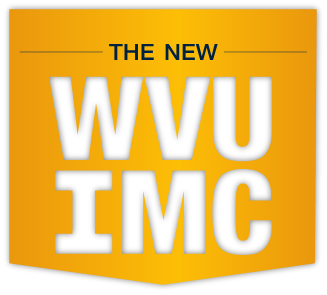
West Virginia University has always offered a renowned Integrated Marketing Communications program. It’s entirely online, customizable, and taught by industry professionals who prepare you to adapt with the industry. And now, we’re responding to the industry once again by lowering tuition, decreasing the number of required courses and offering seven new areas of emphasis.
 TUITION
TUITION
In 2019, tuition was cut -16% to $24,600
RETURN ON INVESTMENT
IMC graduates have reported raises of:
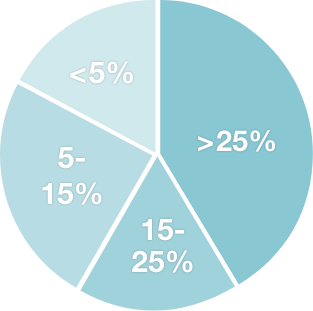
 REQUIRED COURSES
REQUIRED COURSES
Choose from 25+ electives in topics like Web Metrics, Sports Marketing and AR/VR.
AREAS OF SPECIALIZATION
Unique Features of the Discipline
Are you wondering how IMC differs from other advanced communications programs? Are you wondering what makes IMC a unique discipline? We’re here to answer these questions for you.
In the broadest sense, to study communications means to study the craft of delivering a message in an effective way. It’s the “marriage of theory and application;” it’s a “wide-ranging generalist path that can be tailored to work in a variety of specific industries.” Similarly, advanced communications-related degrees — like a Master of Arts in Communication Studies, Mass Communications, Journalism, or Public Relations degrees — tend to be more broad and general in subject matter.
IMC differs from general communications degrees in that it teaches communication professionals how to realign their marketing activities to ensure a constant flow of information to consumers from a variety of media. As a graduate of an IMC program, you not only would excel at marketing communications, but would also be able to execute valuable projects such as analyzing data and managing strategic project planning.
As technology continues to advance and as digital media becomes increasingly important in a variety of businesses, marketing professionals must learn to integrate the approaches of outbound and inbound marketing — in other words, an integrated approach to marketing and messaging as a way of connecting the consumer to the brand involved. The IMC approach attempts to unify all pieces of marketing communications, including advertising, public relations, direct marketing, social media, and sales promotion.
Employment Outlook
According to the Bureau of Labor Statistics, professionals working in marketing at a senior level make an average of $131,180 a year. In 2016, the lowest 10 percent earned less than $67,490, and the highest 10 percent earned more than $208,000. Similarly, the employment rate of marketing managers is expected to grow 9 percent from 2016 to 2026, higher than the national average. Marketing positions are highly desirable and are often sought by other managers and experienced professionals. These statistics demonstrate the high demand for advanced professionals in the marketing field.
In order to make the most of your IMC education and career, here’s a look at how you can use the next 10 years to establish and enhance your career:
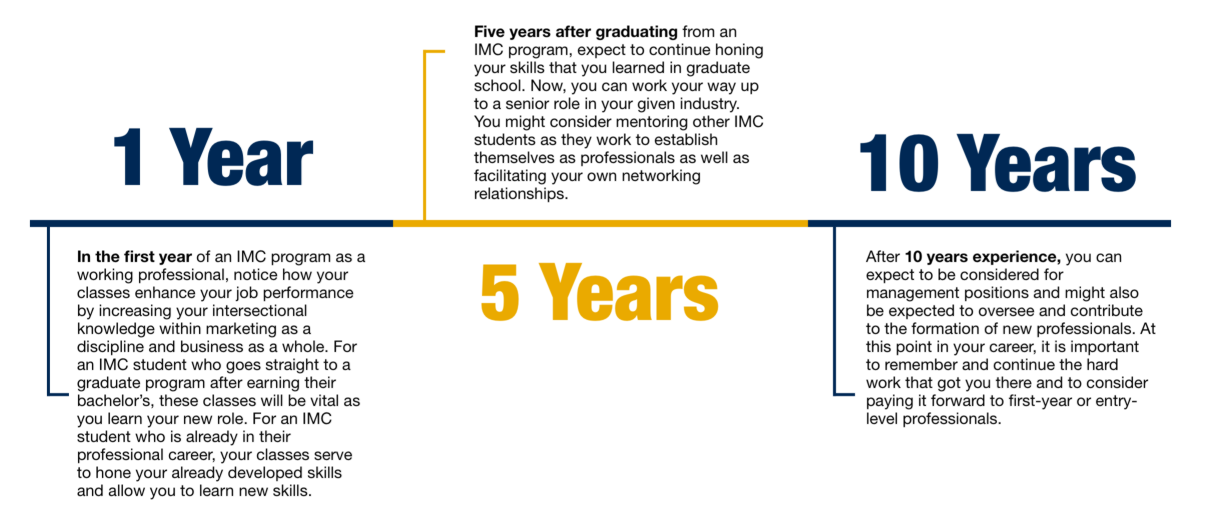
DOWNLOAD A GUIDE TO INTEGRATED MARKETING COMMUNICATIONS!
If you're considering pursuing a graduate degree in marketing, this guide is a must read.
This guide includes:
- A definition of Integrated Marketing Communications
- Career trajectories after graduating with an IMC master’s degree
- Unique benefits of the IMC program at WVU
- And much more!
Download the Guide
Integrated Marketing Communications at WVU
“We are a program that, from the beginning, has stressed the importance of the impact we want to have on the lives and careers of our students. We do everything in our power to ensure that all students have a valuable experience and learn skills and insights they need to be competitive. And they need to learn at the pace of the industry, not the pace of higher education.” —Chad Mezera, Assistant Dean at WVU's Reed College of Media
The Master of Science in Integrated Marketing Communications program, the first of its kind, was launched by the Reed College of Media at West Virginia University in 2003. In the program, communications professionals learn how to align their marketing activities to ensure the constant flow of information to consumers from a variety of media.
One hallmark of the WVU IMC program is its learn-it-today,
The IMC program at West Virginia University is also offered exclusively online, with no classroom attendance required. This enables a student to earn a master’s degree in this fast-growing field from anywhere in the world. How, where, and when you complete the program is completely up to you. There are zero in-person commitments. You can schedule multiple courses at a time to finish quickly or spread them out to balance school with work and family!
In the IMC program, students earn a practical, customizable graduate education that is designed to equip them with the skills to emerge as leaders in the field. IMC students select three electives out of the
Coming Fall 2019, students will have even greater opportunities to customize their degree with a declared Area of Emphasis (AOE). By taking only one extra elective course, students will be able to specialize their IMC degree in areas like Creative Strategy, Data Marketing Communications, Digital
The “Selected-Client” WVU IMC Capstone Experience project presents the opportunity of working with an actual client, thus building your resume and enhancing your portfolio while completing a course requirement.
WVU is also one of the 115 R1 institutions in the nation, meaning we are recognized by the Carnegie Foundation for the Advancement of Higher Education for our dedication to research. We’re a member of the Big 12 Conference and West Virginia's land-grant institution. We have a "Go First" mentality with a heavy focus on innovative learning and technologies.
Faculty Thought Leadership
The program is taught by a diverse faculty – from marketing directors to academics to entrepreneurs – who are recognized as leaders in their fields. In other words, our faculty are the best in the industry. They are professionals from the nation’s capital, the Big Apple, and Silicon Valley. They are practicing what they preach every day and bringing the IMC world into your virtual classroom. They’re more than instructors – they’re mentors and they’re well-connected.
A mixture of full-time and part-time faculty, they own strategic communications agencies, have written books, as well as worked with some of the world’s most valuable brands, including:














IMC Network — 1,500+ Strong
Our 1,500+ Alumni Are Innovating All Around the World
WVU IMC graduates have opportunities to network with alumni all over the world. Coupling the innovative curriculum with these connections, IMC graduates at WVU are introduced to a broad range of strategic marketing positions. The ever-growing alumni network remains a key advantage of the program for those wanting to advance or change their career. Another advantage of WVU’s program is that an IMC alum might re-apply with guaranteed admittance to the program as a non-degree seeking student in order to continue their education. These are only a few key features of a rich program with the history, staff, and alumni to keep it one of the premier programs in the country.
Every year at the Integrate Conference, students and alumni gather together in order to stay up-to-date on the latest market trends. Current students and graduates also use this as a networking opportunity in order to make advantageous connections.
IMC graduates hold positions such as:
-
Brand managers — create brand images that leave a lasting impression on the consumer, while also observing market trends and overseeing a broader marketing strategy
-
Marketing directors — perform a mix of marketing, marketing communications, sales, and business management
-
Public relations directors — strategically curate a favorable opinion of your employer and oversee all outgoing communication and announcements
-
Business owners — for the entrepreneurial type, be your own boss and market your communications skills for your own business
-
CEOs — responsible for the ultimate, strategic-decision making for a company
-
Social Media Strategists — develop and execute a social media strategy in order to increase a company’s online presence and improve marketing and sales efforts
-
Creative Director — creative leads at advertising and marketing companies, who manage designers, artists, copywriters, sales teams, and marketers in order to create a vision for products of their company
-
Communications Specialists — facilitate and maintain relationships between their clients and the public often using media outlets to produce press releases, email communications, and social media
Numbers, like pictures, often speak louder than words. For example, when it came to job success and career outlook, 87.5 percent of IMC graduates from WVU believe earning their master's degrees led to better positions and/or promotions. In a recent survey of graduates:
94
percent of total respondents rated their overall satisfaction level with WVU’s program at an 8 out of 10 or higher.
98.3
percent of respondents stated that they would recommend the IMC program to a friend or colleague.
41
percent of IMC graduates experience more than 25 percent of an increase in income since completing the degree.
Based on these statistics, it is safe to say that earning your master’s degree in Integrated Marketing Communications connects you with a network of like-minded individuals — individuals who are dedicated to innovation in their respective fields.
INTEGRATED MARKETING COMMUNICATIONS AT WVU
Are you already interested in the IMC program here at WVU? Speak with our admissions team or attend an information session to get your specific questions answered.
Request More Information
Upon successful completion of WVU’s Integrated Marketing Communications curriculum, students will be able to:
![]()
Demonstrate a global and multicultural awareness in the development and implementation of marketing communications strategies.
![]()
Illustrate critical thinking, creativity and innovation when collaborating with colleagues and the completing written assignments.
![]()
Compare and contrast the benefits and limitations of various qualitative and quantitative research methods relevant to marketing communications.
![]()
Recognize the roles and implications of law and ethics in marketing communications.
![]()
Design and organize marketing communications materials in a professional manner consistent with contemporary industry-specific standards.
Flexibility of the IMC Program

“Accessibility to quality education is one of our primary missions. We have sophisticated online learning technologies and are able to offer a myriad of resources students can leverage to supplement their academic experience. Graduate students engage in an online discussion with their course instructor and peers every week. Our students also support one another and serve as useful connections, using our program’s online technologies to seek and receive help.”
—Chad Mezera, Assistant Dean at WVU's Reed College of Media
As stated above, WVU’s Integrated Marketing Communications program at West Virginia University is offered exclusively online, with no classroom time required. This enables a student to earn a master’s degree in this fast-growing field from anywhere in the world.
All WVU IMC courses are delivered through a Blackboard-based system, a learning management system with a great deal of functionality. The discussions in the courses are all asynchronous but occur within a dedicated window of time. In other words, there is no set class times in any of the IMC courses because WVU has students from all around the world, but there are established deadlines each week in all courses for assignments and class participation. Students must provide their input and participate before the deadline.
Graduate students engage in an online discussion with their course instructor and peers every week. The professor presents a prompt or a set of problems for students to research and respond to over two days of active discussion. Students are required to post a minimum of four research-based and/or professional responses to their peers, but there are often hundreds of responses as students engage in multiple dialogues and delve into a variety of IMC issues ranging from the ethics of communication in politics or health to the evolution of human interaction and the latest communication technologies. Many of the students are working professionals, and therefore have a rich background of experience to bring to their discussions, which enriches their peers’ perspectives as well.
Faculty are also expected and in fact required to participate in the discussions they oversee in their classes. While it is not a synchronous environment in terms of the faculty and the students all being in the same space at the same time, it is a dynamic message board interface that results in an incredibly robust learning space.
Accessibility to quality education is one of WVU’s primary missions. We have sophisticated online learning technologies and are able to offer a myriad of resources students can leverage to supplement their academic experience.
Dedication to Affordable Learning
Although an advanced degree can set your career flying, higher education can also crash your bank account if you aren’t strategic regarding financial budgeting. While some programs can be extremely expensive, some online programs (like WVU’s IMC program) allow their students to pay in-state tuition regardless of residency. Keep your career on path by searching for highly-ranked online programs that won’t financially debilitate you.
WVU stands out in this regard, as many other universities charge more for out-of-state, online students, while WVU makes exceptions for certain online degrees. Rates are determined by program rather than courses, meaning, taking a course with a subject not in-line with your desired degree will not increase the tuition for a student in a specific program. This allows students to experiment with other fields if their degree has flexibility for elective classes. WVU boasts the moniker “best value” university since tuition rates are low compared to similar higher education institutions.
Financing Your Degree
Making the decision to start a graduate level academic journey is the first step in achieving success for your preferred future. An IMC degree from WVU But the next major hurdle to jump through is to comprehend and plan for a financial commitment. Perceiving graduate school as an investment for you, gives you a perspective that will guide you through the subsequent costs and commitments, both financial and personal.
At WVU, you get a lot of bang for your buck. Tuition is the same regardless of where you live, and because of the flexible programming, you can spread courses out to pay small amounts as you go. And, in the end, it's all worth it. In a recent survey of our graduates, 37.6 percent have received more than 25 percent salary increases since earning their IMC degrees.
Additionally, it’s easy to forget that the price of education continues to rise — so it may be more cost efficient for you to go to graduate school now rather than later. According to a report by JP Morgan Funds, higher education costs are rising faster than any other household expense in recent decades.
Finally, while cost of tuition needs to be part of your decision, do not let it cloud your perspective if your career would benefit from an advanced degree. With the industry always growing, the financial decision to attend graduate school seems less of a risk due to job availability. Not only will you learn marketing best-practices by pursuing your graduate degree, but you will also be able to leverage your degree for a much deserved raise. Similarly, financial aid (like the FAFSA), scholarships, and military benefits still apply at the graduate level.
Additional Financial Aid Tips
![]()
Be creative! There are scholarships available for literally everything.
Do you really, really like Star Trek? Do you have a detailed survival plan for the zombie apocalypse? Just because you're in your twenties or thirties, it doesn't mean you can't win scholarship money for unusual and sometimes silly scholarships.
But really, in all seriousness, WVU has a variety of scholarships specific to IMC and Data Marketing Communications (DMC) students. Current IMC students, as well as new program admits, are encouraged to apply for a supplemental $500 scholarship from the IMC program's General IMC Scholarship Fund. You can also find information about general scholarships and specific scholarships here!
![]()
Be strategic! Complete your degree while working full time.
Although scholarships or starting your own small business are both great options for working while in grad school, you can also see if your current employer is willing to help pay for your degree. Many companies offer partial tuition reimbursement for graduate school. Particularly if you think the knowledge and skills you’ll gain in your grad degree are relevant to your current job, it may be worth asking your employer about your company’s tuition reimbursement policies.
WVU’s IMC program is designed so that students don’t have to quit their job in order to earn this degree. IMC students can work and earn their degree at the same time, from anywhere in the world!
Student Spotlight

Megan Bayles, a 2017 alumna of the IMC program, is now the marketing coordinator at Dogfish Head Brewery in Milton, Delaware.
Why did you choose the WVU IMC program?
I chose WVU’s IMC program because of its prestige, flexibility and affordability. Not only is this degree program known worldwide as a powerhouse, but it's fully online curriculum allows you to complete your studies on your own time and at your own pace, without completely breaking the bank.
Why did you decide to start graduate school right after you received your undergraduate degree?
Upon graduating from college, I didn’t feel like I had found my niche in the marketplace. I knew that eventually I wanted to continue my education, so I thought, “what better time than now?” It would help me broaden my knowledge and enhance my skills, and allow me to explore different facets of the communications and marketing worlds.
How did the IMC degree help you during your job search?
Actually, I learned of my current position and employer from a fellow WVU IMC student. I met him at Integrate West Virginia and when he posted a job opening in our IMC student Facebook group, I jumped on it! I don’t think I would have known about the position if it had not been for the WVU IMC program, and I know I wouldn’t have landed it without the knowledge and skills I gained during my studies.
While in the program, did you have any mentors that helped you get to this point?
In terms of mentors, I didn’t have just one. I consider all of my professors to have been my mentors. The professors in the WVU IMC program are extremely smart, skilled, experienced and approachable. They were always reachable and so willing to help with any project or concern.
I also considered the WVU IMC staff to have been my mentors. I had the privilege and pleasure of working with the WVU IMC staff as a graduate assistant while completing my degree, and all of my coworkers were always more than happy to answer my questions, give me advice and be my springboard for ideas .
What is something you learned in the program that you have been able to apply to your current job?
There are so many lessons I learned through the WVU IMC program that I’ve been able to apply to my job that it’s hard to pick just one.
First, the program taught me a lot about time and stress management. Since the program is all online, it is completely on you to read the lessons, study the textbooks and complete the assignments. You quickly learn the pace at which you can work and the work environment in which you are the most productive. This introspective lesson has taught me how to better manage my time in my current position and has allowed more thoroughly understand my preferred work style.
What would you tell someone who is considering a program like IMC, but is unsure about doing an online program?
I would tell them that I too was unsure about an online program, but the WVU IMC program is unlike any other online program that I’ve ever seen. Its use of Blackboard technology to share ideas and work allows you get to know your classmates and thoroughly understand their points of view. Plus, the professors are there for you every step of the way; totally reachable by both email and phone. Honestly, I feel like I got to know some of my classmates and professors better through this online program than I have in face-to-face classes.
What advice do you have for PR and communications students today?
Never stop learning. This program’s students are so diverse; of different ages, experience levels, ethnicities, cultures. No matter whom you are in classes with, who you meet or who you work with, there is always something that you can learn from them. That is especially true in the worlds of public relations, communications and marketing. Each person’s unique background gives them a different perspective, and allows them to approach problems and prompts differently. If we can open our minds and be willing to continually learn from one another, we will no doubt, be more successful in our jobs.
What was the best part of your education at WVU and how did your time there prepare you for the profession?
The best part of my education was the people that I met through the program. By attending INTEGRATE conferences and avidly participating in my classes, I was able to meet (and ‘e-meet’) some remarkable people. It was those people, and the WVU IMC program in general, that taught me to never stop learning. It is those that are humble and willing to learn that go out there and, for lack of better words, kick some butt! Going into the professional world with this type of mindset has helped me immensely and I can’t wait to see where my career leads!
Subscribe to Our Blog: Marketing Communications Today
Admissions
WVU’s committee conducts a holistic review of each applicant and looks for several key qualifications. Primarily, WVU looks at undergraduate GPA to assess academic potential. Writing is the critical skill that WVU looks for in all application materials, especially in their statement of purpose.
Professional experience is also considered. Students provide resumes as part of their application. In their personal statement, students should explain how the degree will positively impact their careers. The IMC Admissions staff really wants to understand applicants’ motivation, what drives them and what makes them passionate about what they’re doing. People who are passionate and care about the outcome of their graduate school experience have a greater level of grit and determination to get through the parts that are difficult or more ambiguous.
The personal statement is a way for WVU to get to know the applicant, so students should use it as an opportunity to speak with a genuine voice. WVU also uses personal statements to place students with an introductory course instructor who can best support them as they make the transition into their graduate education.
Letters of recommendation are optional, though students are advised to submit them if there are concerns in another area.
Think you’re ready to consider starting an application? As a WVU graduate program, the Integrated Marketing Communications program follows the typical master’s degree application criteria. Here’s a checklist to ensure you obtain and complete all the application elements:
-
Applicants must complete The Online WVU Graduate Application for Admission
-
$60.00 non-refundable application fee (May be waived by attending an information session)
-
Personal statement - detailing in 300-500 words your interest in the IMC program and how it will support your career objectives
-
Résumé
-
Official Academic Transcripts
-
TOEFL or IELTS scores (international students only)
-
Letters of Recommendation (Optional)
-
GRE or GMAT Scores (Optional)
Connect with WVU
The stimulating graduate community of scholar-teachers and passionate learners at WVU creates an environment that welcomes your desire to grow, to learn, and to add to the growing body of knowledge in your field. As a WVU graduate learner, you engage in internationally recognized academic programs. If you want more information about graduate admission requirements, financial aid, or to learn more about the graduate application process, visit WVU’s Integrated Marketing Communications website.
Integrated Marketing Communications Admissions
West Virginia University
Ryan Minnigh
Enrollment Specialist
rminnigh@mail.wvu.edu
304-293-6278









